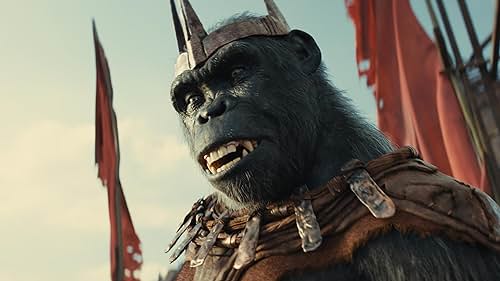
The first Planet of the Apes movie came out in 1968. It, and its four sequels, featured actors in rubber monkey suits.
The first of the reboot movies, which explain how the planet came to be ruled by apes, came out in 2011. These movies brought the Planet of the Apes into the past but also into the present and future, through their impressive use of cgi for the apes.
The most recent installment in the franchise, “Kingdom of the Planet of the Apes,” came out May 10, and like its predecessors, features impressive cgi and powerful storytelling.
The movie starts out with a funeral for the ape’s leader, Cesar (Andy Serkis), who was the first super intelligent ape. He is the main character of the first three movies in the franchise, as he led the apes through conflicts with humans, apes and both at the same time.
After his funeral, we fast forward “many generations later,” and meet Noa (Owen Teague), an ape whose clan rears eagles. It becomes evident that these apes have forgotten about Cesar and his teachings, with most of their laws geared towards how to treat birds and their nests. They’ve also forgotten about human’s former “glory,” calling the now mute creatures echoes, and knowing nothing of the past world.
Life is peaceful, until the clan is attacked by a group of apes armed with rusted masks, torches and electro-staffs. They burn the village, capture most of the apes, kill some, all while shouting “for Cesar” (it’s worth noting that Cesar’s second law was “ape shall not kill ape,” but they seem to have forgotten about that).
Noa’s father, the chief, is killed, and Noa is presumed dead. Noa survives, though, salvages an electro-staff, and vows to free his clan, setting off on a journey that will alter the fates of both apes and humanity.
The main cast is composed of Owen Teague playing Noa, Freya Allan as Mae, one of the last humans capable of speech, Peter Macon as Raka, an orangutan who believes he is the last member of the order of the scholars of Cesar and who vows to preserve Cesar’s teachings and history. On the villains and company side, we have Kevin Durand as Proximus Cesar, the leader of the rust masked apes, and William H. Macy as Trevathan, another talking human who acts as history teacher to Proximus.
The movie is a worthy sequel to the reboot trilogy (Rise, Dawn, and War). Like its predecessors, it focuses on the apes. The humans continue to play an important role, but the apes are the main characters. And like in every movie, we see the apes become a bit more human in how they behave.
In “Rise” (2011) the apes organize themselves and revolt together. In “Dawn” (2014), they fight a fight that could be avoided, but is not because of a desire for revenge. In “War” (2017), the apes discover the art of war, and continue to fight humans to determine who will be the dominant species.
In “Kingdom,” the apes come out firmly on top, and we see more trends of human history in how the apes organize themselves. As Proximus twists the teachings of benevolent leader Cesar to serve his own ambitions, the apes begin building kingdoms and creating religion-based monarchies, continuing to use humans as scapegoats.
The humans aren’t exempt from blame, though, and by observing Mae, we realize just how similar the apes and humans have become. Mae schemes and uses Noa to reach her goals, just as Noa does to Mae, which is recognized by both. Proximus argues that humans will always try to reassert themselves as dominant species, and Mae proves his point multiple times.
The magnificent cgi brings the apes to life, displaying incredibly realistic emotion and magnificent settings (the corpses of skyscrapers and ships overgrown with plants create an awe-inspiring “concrete jungle,” in every sense of the phrase).
The reason that the Planet of the Apes franchise captivates viewers so much is because even though the movie centers on a different species, humanity is constantly reflected in the evolution of the apes and their societies.
Proximus builds on the foundations of what was left behind by humans, just as every empire in history has ever done. He inspires fanatical devotion among the apes through twisted religion, just like countless leaders have.
It becomes pretty clear at the end of the movie that humans and apes are heading towards more conflict, and the negative trends of human history are still present in ape society.
At the beginning of the movie, it says that humans were victims of their hubris, and that caused their downfall.
That’s true, but as you watch “Kingdom,” it’s worth asking yourself: were humans victims of their hubris, or are we all, humans and apes, victims of our intelligence?
























